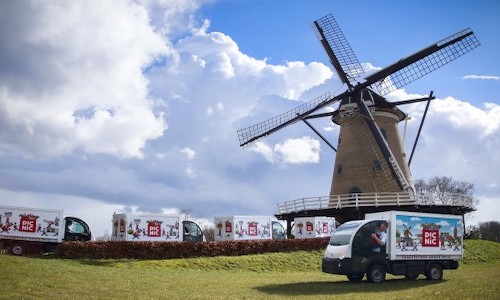Customer care and scalability in service, communication, distribution, and data processing are priorities for many organisations and a particular challenge for those growing to the next stage in their lifecycle.
In many cases, organisations have different systems for different purposes and departments, such as service, sales, and distribution, and they’re often limited and complicated when it comes to scaling up. So, what happens when you suddenly grow faster than expected and your platforms aren’t ready yet for rapid expansion? How do you simplify the technology base to enable growth, safeguard service quality, and even prepare for global expansion?
Dutch online grocers, Picnic, faced just these challenges. Founded in 2015, Picnic operates a platform that enables customers to shop for supermarket essentials online at low prices. The company receives its customers’ orders through its platform and sends them on to bakers, greengrocers, and other suppliers. Orders are then delivered the next day using electric vehicles, enabling consumers to order their groceries via a single source. Picnic has around 5,000 employees and is growing at a rate of 100%, year-on-year.
Consolidating from eight systems to one with Service Cloud
We talked to Steven van de Ridder, Director of Advanced Analytics at Picnic, about how the company addressed these growth challenges.
“Our excellent growth rate of 100% year-on-year sounds ideal, but our customer channel could not keep up. ”
Van de Ridder goes on to explain that “with multiple customer care applications, cumbersome processes, and lengthy agent training times, our average case handling times and CSat scores needed improvement. To ensure qualitative and sustainable growth and continue to deliver an excellent customer experience, we had to transform our approach. That’s when we decided to streamline our customer operations, create a template that would enable us to roll out our business in other countries, and integrate our front-end and back-end systems. This involved consolidating eight different systems into one: Service Cloud.”
An ecosystem for excellent customer care
To fulfil these goals, Picnic selected VANEIGENS to lead and implement the transformation. We asked Boudewijn Wildeman, CEO at VANEIGENS, about how it approached this project to help Picnic overcome its challenges.
“With service channels overloaded and the number of tools increasing the IT management burden, we needed to help Picnic integrate its service capabilities within a single platform. ”
“To align all ends and needs,” Wilderman continues, “we needed to design Picnic an interacting ecosystem that captures and streamlines all customer service touchpoints, for both internal and external stakeholders. It’s great that Salesforce offers this ecosystem, so we can help companies like Picnic overcome these complex challenges.”
To develop and integrate all the communication channels within the ecosystem, VANEIGENS assisted with three key tasks:
1. Implementing Service Cloud, and integrating all required service channels, including email, SMS, phone, WhatsApp, and a proprietary app. VANEIGENS’ AppExchange app, AskAmy, was also integrated as a digital messaging tool.
2. Introducing Knowledge Base to facilitate improvements in average case handling time and shorten agent training time.
3. Integrating ERP and PIM (Product Information Management) systems at the backend. The objective was to create a global template that can be easily reused for deployment in additional countries to align with Picnic’s global expansion ambitions.
These three topics enabled Picnic to set up a scalable customer care centre to handle the increasing workload, which was exacerbated by the COVID-19 crisis. In addition to accelerating growth, the crisis changed customer behaviour. With Service Cloud implemented as the crisis began, it wasn’t a moment too soon.
A smooth launch during the COVID-19 crisis
Going live with Service Cloud was planned for the beginning of the outbreak of the COVID-19 crisis in the Netherlands. Van de Ridder confirms why they decided to move forward in these uncertain times.
“Launching Service Cloud during this period of time was not without anxiety. But we had so much trust in Salesforce, our internal development team, and our implementation partner VANEIGENS, that we decided to go ahead.”
“To be honest, we had an incredibly smooth go-live, and for a migration in such turbulent times, that was surprising,” Van de Ridder explains. “We are very happy with the solution in place and couldn’t imagine a better implementation partner for this transformation than VANEIGENS.”
The results of this smooth go-live include:
1. Picnic now has a flexible, scalable platform for customer interactions, that’s fully integrated with their backend systems and consumer app.
2. Established a mainly digital customer care centre.
- 90% of enquiries are via WhatsApp and the Picnic app.
- 10% are phone calls.
1. After successfully going live in the Netherlands and Germany, other European countries are ready to be launched.
2. Thanks to thorough training and knowledge transfer from VANEIGENS to Picnic personnel, Picnic can now continue the global deployment independently.
3. With Service Cloud and VANEIGENS’ AskAmy Messaging app, Picnic has been able to reduce the average number of clicks per case from 24 to just seven.
Salesforce and VANEIGENS are now working together with Picnic to define new Salesforce-based innovation projects. So, this customer success story is to be continued…
Want to learn more? Check out the interview with Steven van de Ridder at the Salesforce Live: Benelux event, for more detail on Picnic’s transformation with Service Cloud, led by VANEIGENS. For more information on VANEIGENS and its services for enabling your next-level customer engagement, please go to its website: www.vaneigens.com.




